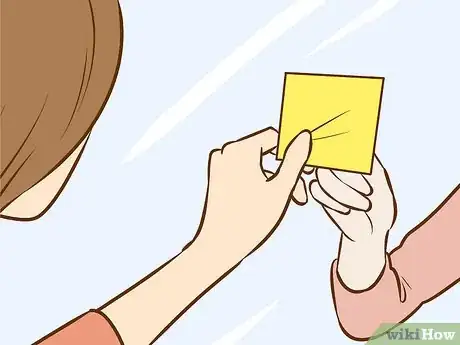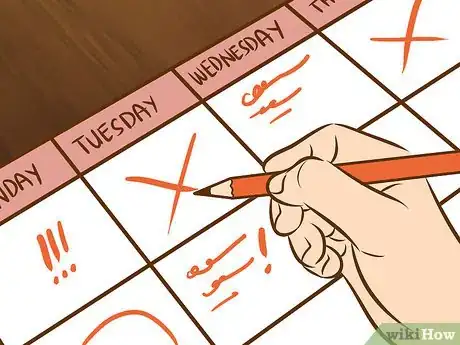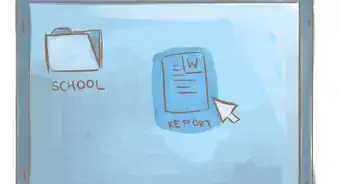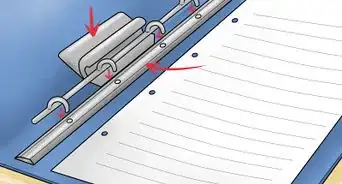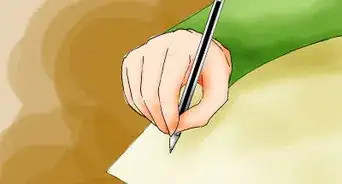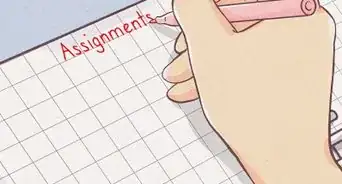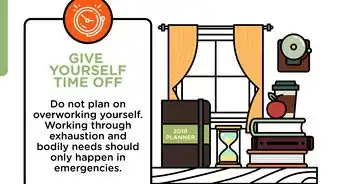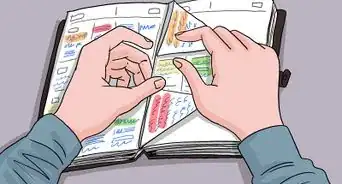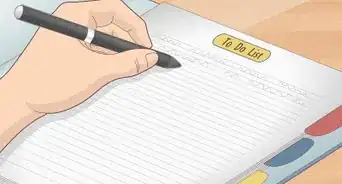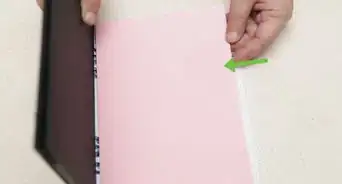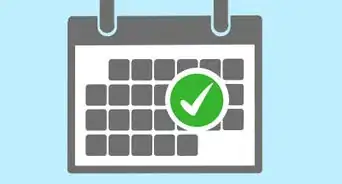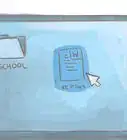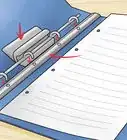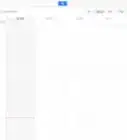This article was co-authored by wikiHow Staff. Our trained team of editors and researchers validate articles for accuracy and comprehensiveness. wikiHow's Content Management Team carefully monitors the work from our editorial staff to ensure that each article is backed by trusted research and meets our high quality standards.
This article has been viewed 46,558 times.
Learn more...
School agendas, or planners, can be a vital part of your daily life. They can keep you on track with assignments, due dates, tests and quizzes. But sometimes it's hard to know how to organize your agenda. Knowing how to find the right planner and what tactics to use can keep you on the right track and make your academic year easier.
Steps
Gathering Supplies
-
1Buy an agenda that works for you. Do you need a planner with lots of space for writing? Does it need to be small enough to fit in your bag or backpack? Consider space for notes, how much room is allotted for each day, whether a monthly calendar is included. Choose one that fits your personality and needs and you'll be more likely to use it.
- Academic-year planners usually run from summer to summer, across calendar years, making them ideal for students.
- Planners with wire binding lie flat and can be folded over, making them more versatile.
-
2Find or buy additional supplies. Beyond just an agenda, you'll want multicolored pens or pencils, highlighters, self-stick notes and page flags. You may also want paperclips for attaching loose sheets and stickers to give some extra personality to your agenda.Advertisement
-
3Personalize your agenda. Give your planner some personality and you'll be more likely to enjoy using it. Decorate with stickers, markers, decals or anything else that reflects your interests. Make it fun and you'll get more out of it!
Getting Organized
-
1Write important dates in your calendar. Note the start and end of your academic year, semester breaks, holidays and any other relevant dates. Include school events such as football games, dances and standardized test dates too. [1]
-
2Add your class schedule. Copying a schedule of classes into your planner means you'll always have it handy. This can help if your classes don't all meet every day or you're still trying to remember the order.
-
3Add dates from your syllabus. If your teacher gives you a semester plan, use it. Write down dates of major projects, tests, quizzes and anything else that might be relevant. Make a list of books or other supplies you know you'll need right away.[2]
-
4Make it part of your routine. Keep your agenda with you all the time and consult it every time you get an assignment and every afternoon when you're reviewing homework. No amount of writing in your agenda will help if you don't consult it later![3]
-
5Write assignments down right away. Get in the habit of writing homework and tasks down immediately. If it's a long term assignment, write down when it's assigned, a few key reminder dates along the way, and the date it's due. Write it down both on your monthly calendar and the actual date it's due. This will help you plan ahead more effectively, and writing things down helps reinforce them in your mind.
-
6Highlight tests and quizzes. Work backwards, giving yourself reminders a week ahead and a few days ahead to study or work on upcoming projects, so you're not left scrambling at the last minute. For bigger projects, designate work time along the way.[4]
-
7Color-code your classes. If you're a visual learner, or like to make things easy to see at a glance, using a different color for each class or subject will make it easy to see what's going on in any given week. But don't overdo it, or you won't be able to remember what stands for what. [5]
-
8Cross completed assignments off. If you've turned in an assignment, make a check mark or cross it off and you'll know for sure it's done. Then you'll never have to wonder whether you remembered your math homework.
Making the Most of Your Planner
-
1Make a to-do list. Every evening, make one for your day ahead. Review it at the end of the week. Having a daily and weekly to-do list will keep you on track and give you the satisfaction of crossing things off when they're done. [6]
-
2Use page flags or tabs to mark important pages. If you've got things you need to consult again and again, flagging the page will make it much easier to find and reference. Mark each month with tabs and it will be easier to find what you're looking for.
-
3Use self-stick notes for temporary reminders. Write down things like phone numbers, important information and notes to yourself. But if it's really vital, write it in your planner for real.
-
4Keep everything in it. If your planner has pockets, use them for handouts, permission slips, or other helpful information. You can also paperclip relevant documents for the dates you'll need them. [7]
-
5Use it for daily life. You can also use your planner to keep track of family vacations, dates, appointments, activities and anything else you have to do. It will be easier to keep track of everything and you'll be able to see at a glance what might interfere with schoolwork. And make sure you schedule free time, too!
Community Q&A
-
QuestionWhy do I have notebooks if I write in binders?
 Community AnswerIt is just another option for your or from your teacher. It is best to follow your teachers instructions.
Community AnswerIt is just another option for your or from your teacher. It is best to follow your teachers instructions. -
QuestionHow do I make a "Daily things to do" agenda?
 Community AnswerYou can do a table on Word and write all the things you need to do, then print it off and tick every time you've done something on your list.
Community AnswerYou can do a table on Word and write all the things you need to do, then print it off and tick every time you've done something on your list.
References
- ↑ https://www.thoughtco.com/using-student-planners-1857577
- ↑ https://www.thoughtco.com/using-student-planners-1857577
- ↑ https://www.additudemag.com/adhd-student-planner/
- ↑ https://www.thoughtco.com/using-student-planners-1857577
- ↑ http://www.collegefashion.net/college-life/how-to-organize-your-agenda/
- ↑ https://www.thoughtco.com/using-student-planners-1857577
- ↑ https://www.thoughtco.com/using-student-planners-1857577
About This Article
If you’re having trouble organizing your school agenda, try using your planner to keep track of your personal life as well so that you're more likely to want to use it! Additionally, make sure to write down new assignments right away, so you don’t forget! When you have some spare time, write down your class schedule, and add any important due dates from your syllabus. Finally, for a try using colored dividers or markers to organize by class, and don't forget to highlight important tests and quizzes. For more ways to make the most out of your agenda and ways you can personalize your planner, read on!


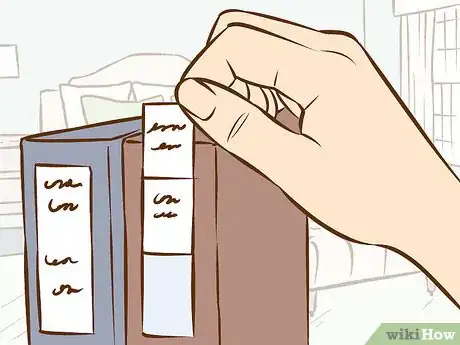
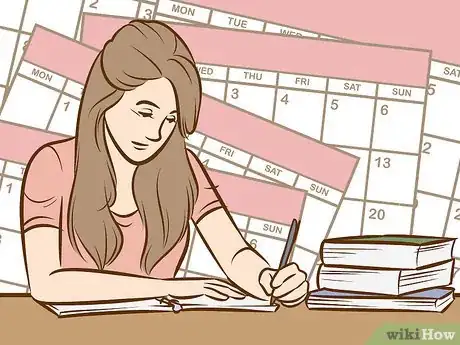
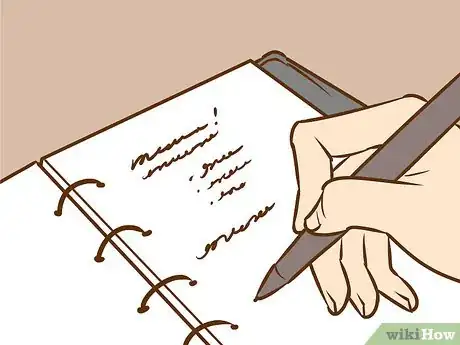
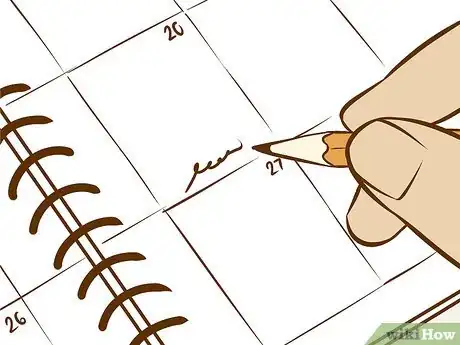



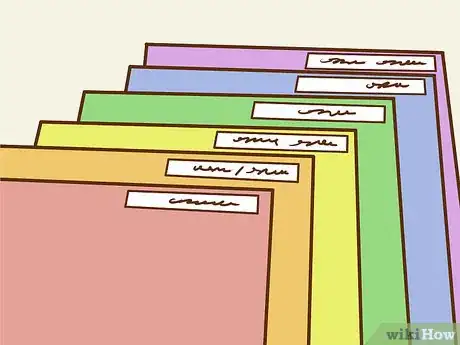
-Step-9.webp)


